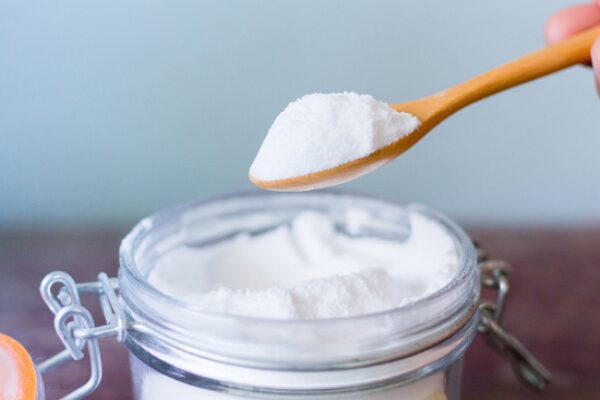No baking soda? no problem! Baking soda is an important part of our recipe, especially in baking goods, so knowing a baking soda substitute that can better fit its properties can make all the difference. Yes, you could leave out the baking soda in your recipe, but the ultimate result will be different. Cookies will most likely be flat, and pancakes will be light and fluffy. They’ll still taste good, but the texture will change.
If you’re out of baking soda on hand, you can find in this article the best baking soda substitute, so keep reading and let’s start!
What Is Baking Soda?

Baking soda, scientifically known as sodium bicarbonate (NaHCO3), is a versatile white crystalline powder with various household and culinary uses. It is primarily known for its leavening properties, making it a popular ingredient in baking. When combined with an acid, such as vinegar or lemon juice, baking soda releases carbon dioxide gas, causing dough or batter to rise. Moreover, baking soda acts as a mild abrasive and deodorizer, making it suitable for cleaning and odor absorption purposes. Its alkaline nature also allows it to neutralize acid, making it useful in cooking and as an antacid for indigestion relief.
What Does Baking Soda Do?
In baking, baking soda serves as a leavening agent that helps dough or batter rise. When combined with acidic ingredients like buttermilk, lemon juice, or vinegar, baking soda produces carbon dioxide gas. This gas gets trapped in the mixture, creating air bubbles and causing the dough or batter to expand and become light and fluffy during baking. Baking soda is commonly used in recipes for cakes, cookies, quick breads, and pancakes. Its leavening properties ensure proper texture and volume in baked goods, resulting in a desirable rise and a tender, moist interior.
Baking Soda and Baking Powder: What’s the Difference?
Baking soda and baking powder are both leavening agents used in baking, but they differ in composition and how they react. Sodium bicarbonate or known as baking soda, is a pure alkaline compound. It requires an acidic ingredient (such as lemon juice, yogurt, or buttermilk) in the recipe to create a chemical reaction. This reaction produces carbon dioxide gas, causing the dough or batter to rise.
On the other hand, baking powder is a mixture of baking soda, an acid (usually cream of tartar), and a stabilizer. Baking powder is a complete leavening agent that already contains both the alkaline and acidic components needed for the reaction. When exposed to moisture and heat during baking, baking powder releases carbon dioxide, resulting in the rising of the baked goods.
Can I Leave Out the Baking Soda?
The use of baking soda in recipes can vary depending on the specific purpose it serves. Leaving out baking soda from a recipe can have significant effects on the final outcome. If a recipe specifically calls for baking soda, omitting it may result in a dense, flat, or improperly textured baked good. Without the leavening action of baking soda, your recipe may not rise as intended.
The Best Baking Soda Substitute
If you’re running out of baking soda when baking, try one of these substitutes you may find in your kitchen:
1. Baking Powder
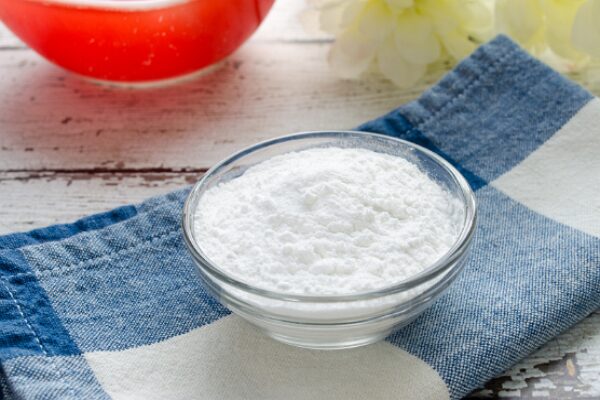
Without question, baking powder is the greatest baking soda substitute available. Baking soda and baking powder are not the same, baking soda is stronger, but they are both leavening agents that work in comparable ways. When dealing with anything sugar-based and dense, substitution works best because the ingredients can provide various textures when utilized alone.
How to Substitute:
To substitute use 3 teaspoons of baking powder, if your recipe calls for 1 teaspoon of baking soda.
2. Self-Rising Flour
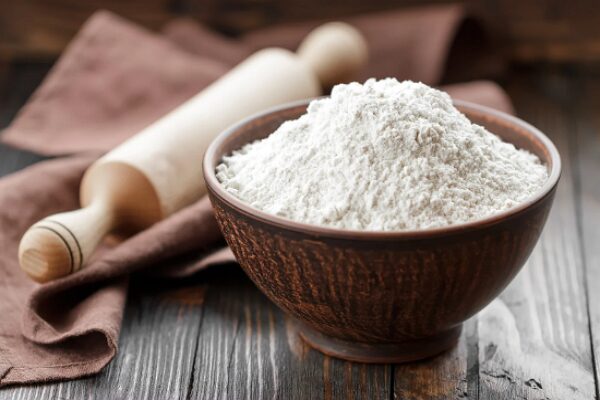
In recipes that require flour, only use self-rising flour as a substitute for baking soda. It will vary depending on each recipe, so use the outline below to do the calculation for single recipes. Self-rising flour serves as a baking soda alternative. That means, the flour has already been leavened.
How to Substitute:
1 cup of self-rising flour contains 1 1/2 teaspoons of baking powder and 1/4 teaspoon of salt.
3. Egg Whites
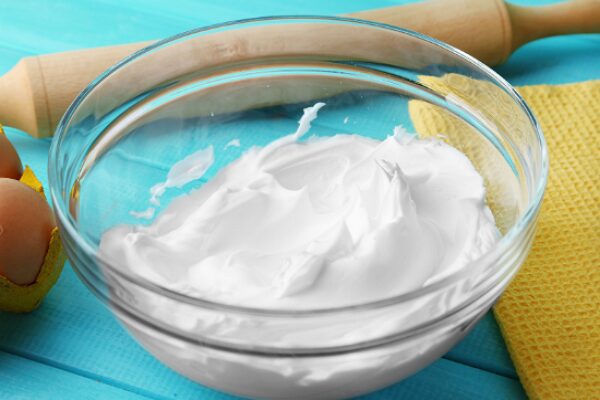
Egg whites can be a suitable substitute for baking soda in certain baking recipes. While they don’t possess the leavening properties of baking soda, egg whites can help add volume and structure to baked goods.
How to Substitute:
To use egg whites as a baking soda substitute, begin by separating the egg whites from the yolks. Whisk the egg whites until they form stiff peaks, then fold them into the batter or dough. The whipped egg whites will provide a light and airy texture to the final product. Still, it’s important to note that this substitution may not work for all recipes, so consider it based on the specific baking needs.
4. Club Soda
Club soda can also be used as a substitute for baking soda. As with the egg white procedure, you should eliminate the same amount of liquid from your recipe as you add back in the form of club soda.
How to Substitute:
To replace baking soda with club soda, substitute 1/4 cup of club soda for 1/4 cup of the liquid called for in the recipe. And, once the club soda has been added, work quickly to combine and place the baked item in the oven, as the bubbles will begin to pop instantly, and the faster you get your good in the oven, the faster the bubbles will be able to begin working.
5. Potassium Bicarbonate & Salt
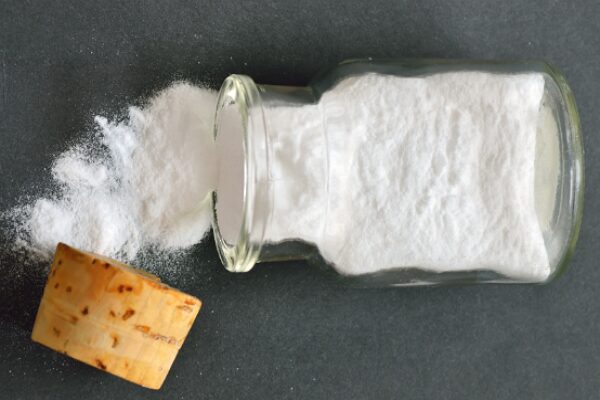
Potassium bicarbonate is a substitution that only a few people will have on hand. This mineral is utilized in antacids and for people who have low potassium levels.
How to Substitute:
In any recipe, potassium bicarbonate can be used in place of baking soda in a 1:1 ratio. Because it lacks the sodium that baking soda does, you will need to add in your recipe an additional 1/4 to 1/2 teaspoon of salt.
6. Baker’s Ammonia
Baker’s Ammonia should only be substituted for baking soda for making thin and crispy baked items. It’s not a good idea when creating cookies, cakes, muffins, or anything else with a lot of moisture. It has a strong ammonia odor that is too strong with high-moisture foods but bakes off with low-moisture ones.
How to Substitute:
To substitute baker’s ammonia for baking soda, use a one-to-one ratio.
FAQs
What can I use as a substitute for baking soda in baking?
There are a few alternatives you can try if you don’t have baking soda on hand. Baking powder is a commonly used substitute, and you can use it at a 3:1 ratio (3 parts baking powder for 1 part baking soda). You can also use potassium bicarbonate or cream of tartar as substitutes, although they may slightly alter the taste of your baked goods.
Can I use baking powder instead of baking soda in a recipe?
Yes, you can use baking powder as a substitute for baking soda. However, keep in mind that baking powder is not a direct one-to-one substitute for baking soda. Baking powder is a combination of baking soda, cream of tartar, and sometimes cornstarch. To replace baking soda with baking powder, use a 3:1 ratio (3 parts baking powder for 1 part baking soda) in the recipe.
How does using baking powder instead of baking soda affect the final result?
Baking powder contains additional ingredients that can affect the taste and texture of your baked goods. It may result in a slightly different flavor and a more tender crumb. Baking powder also contains a small amount of acid, so you may need to adjust the acidity of your recipe if you’re using it as a substitute for baking soda.
Can I substitute yeast for baking soda?
Yeast is not a suitable substitute for baking soda in most recipes. Yeast is used as a leavening agent in bread and other yeast-based recipes, while baking soda is used as a chemical leavening in recipes that require a quick rise or a reaction with an acidic ingredient. They function differently, so it’s best to use the appropriate leavening agent for the specific recipe.
Are there any natural alternatives to baking soda?
Yes, there are a few natural alternatives to baking soda. One option is potassium bicarbonate, which can be used as a substitute in a 1:1 ratio. Another natural alternative is cream of tartar, which can be used as a substitute at a 2:1 ratio (2 parts cream of tartar for 1 part baking soda). However, keep in mind that these substitutes may have a slightly different flavor profile.
Can I omit baking soda altogether from a recipe?
Baking soda is often used in recipes to provide leavening and aid in browning. Omitting it altogether can significantly affect the texture and taste of your baked goods. If you don’t have baking soda, it’s best to look for a suitable substitute or find a different recipe that doesn’t rely on it as a key ingredient.
In Summary
So, you don’t have to worry when you’re out of baking soda, this versatile ingredient commonly used in baking, can be substituted with other ingredients in particular recipes. When a recipe calls for baking soda but it’s unavailable, you can substitute it with another substitution we’ve mentioned above. Experimenting with substitutions can yield satisfactory results, ensuring your baked goods turn out delightful even without traditional baking soda.

